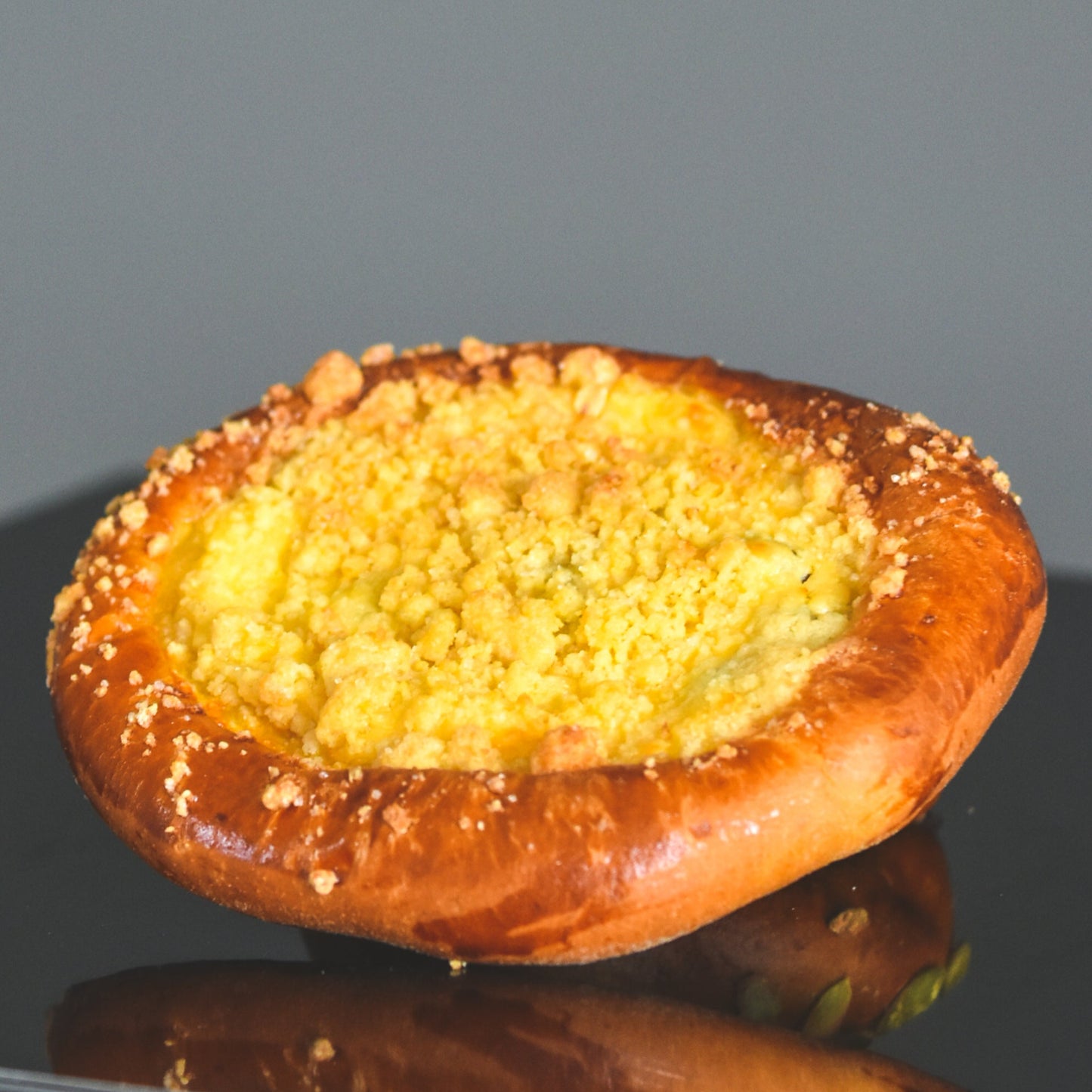OGYY
Bun with cheese 240 g
Bun with cheese 240 g
Couldn't load pickup availability
Hearty Bun with Cheese
Fluffy yeast dough baked with traditional leaven, filled with creamy cheese filling and sprinkled with buttery crumble. Before baking, each piece is brushed with egg to obtain a golden shine.
Ingredients
- wheat flour type 00 (Italian)
- whole milk
- liquid yeast
- eggs (whole)
- butter (82% milk fat)
- cheese curd* (fat 18%)
- white sugar
- yolks
- butter bun crumble** (wheat flour, sugar, egg yolks, butter)
- egg (to brush the dough before baking)
- salt
Nutritional values (1 pc. ≈ 240 g )
| Nutrient | Quantity | %RWS* |
|---|---|---|
| Calories | 420 kcal | 21% |
| Fat | 16g | 23% |
| - including saturated | 9g | 45% |
| Carbohydrates | 56g | 22% |
| - including sugars | 20g | 22% |
| Fiber | 2.5g | 10% |
| Protein | 10g | 20% |
| Salt | 0.7g | 12% |
| Cholesterol | 85mg | 28% |
| Vitamin B₂ (riboflavin) | 0.16mg | 11% |
| Iron | 2.1 mg | 15% |
| Magnesium | 25mg | 7% |
*RWS – Reference Intake Value (2000 kcal).
Allergens
- gluten (wheat flour)
- milk (whole milk, cottage cheese, butter)
- eggs (eggs in the dough + egg for spreading + egg yolks in the filling and crumble)
- may contain traces of: sesame, nuts
Health benefits
- Protein and calcium: The cheese filling made of cottage cheese and egg yolks provides high-quality protein and calcium, necessary for strong bones and proper functioning of the muscular system.
- B vitamins: Eggs and yeast in the starter provide vitamins B₁, B₂ and B₆, which support energy metabolism and the functioning of the nervous system.
- Healthy fats: Butter is a source of saturated fatty acids, necessary for the absorption of fat-soluble vitamins (A, D, E, K).
- Moderate Fiber: A little flour from the starter supports proper digestion and a sense of satiety.
- Pure ingredients: Baking is made exclusively from natural products – without preservatives or artificial flavours.
Contraindications and recommendations
- For diabetics: Contains approx. 20 g of simple sugars – we recommend not exceeding ½ of a yeast bun.
- Intolerances and allergies: The product is not suitable for people with celiac disease (contains gluten), lactose intolerance (milk, cottage cheese, butter), egg allergy (eggs) and for people allergic to sesame or nuts (cross-contamination may occur).
- Caloric value: One yeast bun is approximately 420 kcal – people on a reducing diet should consume ½ – 1/3 of the baked product and combine it with a light meal rich in protein and vegetables.
- Storage: At room temperature (18 – 20 °C), in a paper wrapping or linen cloth to maintain fluffiness and avoid excessive moisture.
- Recommended consumption: Preferably within 2-3 hours of delivery so that the yeast cake retains its full aroma and dough structure.
Method of preparation and serving
- Before baking: Brush the bun with egg (with a brush) – this gives the baked product a soft, golden colour and a delicate shine.
- Reheating (after delivery): Place the bun in an oven preheated to 160 °C for 3-4 minutes (or in a microwave for 15-20 seconds). The dough will regain its fluffiness and the cheese filling will become even creamier.
- Serving solo: Perfect with latte or fruit tea – the combination of buttery pastry with a delicate cheese filling delights every gourmet.
- Dessert option: Serve with a dollop of thick Greek yogurt or a scoop of vanilla ice cream – the contrast of temperatures and textures will enhance the pleasure of eating.
-
Suggestions for additions:
- a sprinkle of roasted almonds and a bit of honey – a crunchy-sweet finish;
- vanilla or caramel sauce – a creamy accent on top;
- fresh fruit (raspberries, blueberries) – the sour note perfectly breaks the sweetness of the filling.
* Reference Intake Value (RIV) for an adult based on a 2000 kcal diet.











